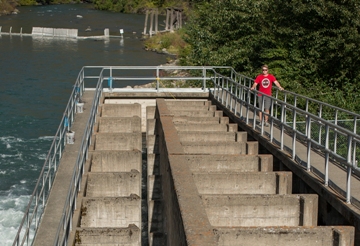Salmon forced to “sprint” less likely to survive migration

When salmon encounter turbulent, fast-moving water—such as rapids or areas downstream of dams—they must move upstream using a behavior known as “burst swimming” that is similar to sprinting for humans.
“Days after sockeye passed through extremely fast-moving water, we started to see fish dying only a short distance from their spawning grounds,” said Nicholas Burnett, a research biologist at UBC and lead author of the study, published today in Physiology and Biochemical Zoology.
“We now understand how this important but energetically costly swimming behavior can impact the survival of sockeye during their upstream migration,” said Burnett, who worked on this study as part of his master’s research with UBC Professor Scott Hinch and Carleton University Professor Steven Cooke.
“Our work demonstrates how important it is for salmon to have easy access around obstacles in the river.”
Researchers tagged fish with accelerometer transmitters, a new tracking technology that records how fast fish swim and how much oxygen they consume.
Tagged fish were released in the high flows downstream of a dam in southwestern British Columbia and tracked as they navigated through a fishway and two lakes to their spawning grounds.
N. J. Burnett, S. G. Hinch, D. C. Braun, M. T. Casselman, C. T. Middleton, S. M. Wilson, and S. J. Cooke, “Burst Swimming in Areas of High Flow: Delayed Consequences of Anaerobiosis in Wild Adult Sockeye Salmon,” Physiological and Biochemical Zoology 87(5), September/October 2014. http://www.jstor.org/stable/10.1086/677219
Physiological and Biochemical Zoology (http://journals.uchicago.edu/PBZ) publishes original research in animal physiology and biochemistry, with a specific emphasis on studies that address the ecological and/or evolutionary aspects of physiological and biochemical mechanisms. Studies at all levels of biological organization from the molecular to the whole organism are welcome, and work that integrates levels of organization to address important questions in behavioral, ecological, evolutionary, or comparative physiology is particularly encouraged.
Contact: Emily Murphy / 773-702-7521 / emurphy@press.uchicago.edu
Source Contact: Heather Amos / University of British Columbia Public Affairs heather.amos@ubc.ca
Media Contact
All latest news from the category: Ecology, The Environment and Conservation
This complex theme deals primarily with interactions between organisms and the environmental factors that impact them, but to a greater extent between individual inanimate environmental factors.
innovations-report offers informative reports and articles on topics such as climate protection, landscape conservation, ecological systems, wildlife and nature parks and ecosystem efficiency and balance.
Newest articles

Properties of new materials for microchips
… can now be measured well. Reseachers of Delft University of Technology demonstrated measuring performance properties of ultrathin silicon membranes. Making ever smaller and more powerful chips requires new ultrathin…

Floating solar’s potential
… to support sustainable development by addressing climate, water, and energy goals holistically. A new study published this week in Nature Energy raises the potential for floating solar photovoltaics (FPV)…

Skyrmions move at record speeds
… a step towards the computing of the future. An international research team led by scientists from the CNRS1 has discovered that the magnetic nanobubbles2 known as skyrmions can be…





















